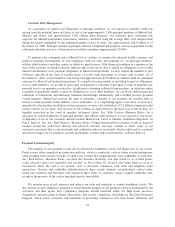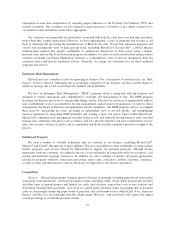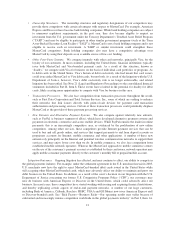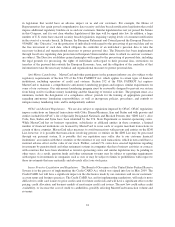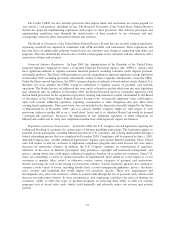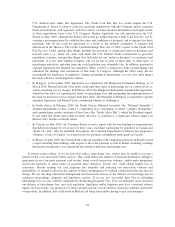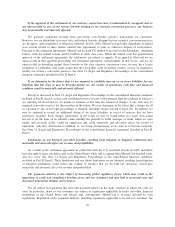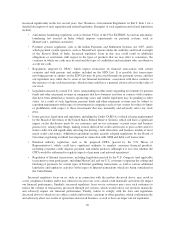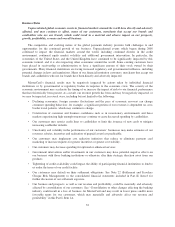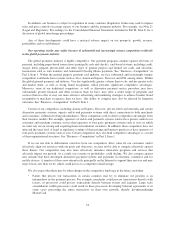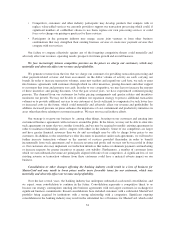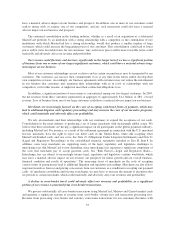MasterCard 2009 Annual Report Download - page 38
Download and view the complete annual report
Please find page 38 of the 2009 MasterCard annual report below. You can navigate through the pages in the report by either clicking on the pages listed below, or by using the keyword search tool below to find specific information within the annual report.U.S. antitrust laws under this legislation. The Credit Card Fair Fee Act would require the U.S.
Department of Justice to observe collective merchant negotiations with the Company and its customer
financial institutions (and separately with Visa and its customer financial institutions) and report results
of those negotiations back to the U.S. Congress. Similar legislation was also introduced in the U.S.
Senate in June 2009, although the Senate bill would go further than the Credit Card Fair Fee Act by
creating a government panel to establish the terms and conditions of payment card acceptance for those
merchants who do not reach an agreement as a result of the antitrust exemption. A separate bill
introduced in the House—“The Credit Card Interchange Fees Act of 2009”—prior to the Credit Card
Fair Fee Act would, among other things, prohibit the inclusion of certain provisions in payment card
network rules (e.g., honor all cards) and direct the U.S. Federal Trade Commission to prescribe
regulations to ensure, among other things, that such rules are not “unfair or deceptive” to consumers and
merchants. It is not clear whether Congress will act on one or more of these bills, or other types of
interchange initiatives, and what form any such legislation may ultimately take. In addition, pursuant to
separate legislation, the General Accountability Office (“GAO”) conducted a study on interchange and
submitted the findings and conclusions of that study to Congress. Although the GAO study did not
recommend any legislative or regulatory changes pertaining to interchange, it is not clear what impact
the study will have on the legislative debate.
• In Hungary, in December 2009, legislation was adopted by the Hungarian Parliament limiting, as of
March 2010, MasterCard (and Visa) debit, credit and other types of interchange fees at various levels, as
well as merchant service charges. In February 2010, the Hungarian Parliament amended this legislation,
which had the effect of repealing the limits on interchange fees and postponing the implementation of
the limit on merchant service charges until May 2010. The President of Hungary is expected to sign the
amended legislation, and MasterCard is considering whether to challenge it.
• In South Africa, in February 2009, the South African National Assembly (the “National Assembly”)
adopted amendments to that country’s competition laws concerning so-called “complex monopolies”
and criminalizing certain violations of those laws (the “South Africa Bill”), which the President signed.
If and when the South Africa Bill becomes effective, it could have a significant adverse impact on
MasterCard’s business in South Africa.
• In Canada, in June 2009, the Canadian Senate issued a report with the non-binding recommendations
that debit interchange be set at zero for three years, merchant surcharging be permitted in Canada and
“honor all cards” rules be modified. In response, the Canadian Department of Finance has proposed a
voluntary “Code of Conduct” on related issues for payment card industry participants in Canada.
• In Brazil, in April 2009, the Central Bank of Brazil (together with competition agencies in Brazil) issued
a report detailing their findings with respect to the retail payment system in Brazil, including a finding
that greater transparency was required in the setting of domestic interchange rates.
If issuers cannot collect, or we are forced to reduce, interchange fees, issuers may be unable to recoup a
portion of the costs incurred for their services. This could reduce the number of financial institutions willing to
participate in our four-party payment card system, lower overall transaction volumes, and/or make proprietary
end-to-end networks or other forms of payment more attractive. Issuers also could charge higher fees to
consumers, thereby making our card programs less desirable and reducing our transaction volumes and
profitability, or attempt to decrease the expense of their card programs by seeking a reduction in the fees that we
charge. We are devoting substantial management and financial resources to the defense of interchange fees in
regulatory proceedings, litigation and legislative activity. If we are less successful than Visa in defending
interchange fees, we also could be competitively disadvantaged against Visa. If we are ultimately unsuccessful in
our defense of interchange fees, any such regulation, legislation and/or litigation may have a material adverse
impact on our revenue, our prospects for future growth and our overall business, financial condition and results
of operations. In addition, this could result in MasterCard being fined and/or having to pay civil damages.
28


